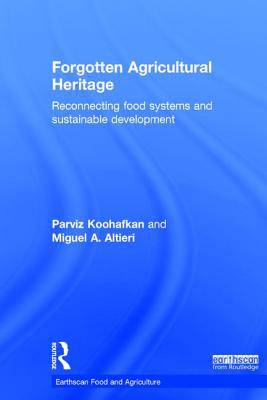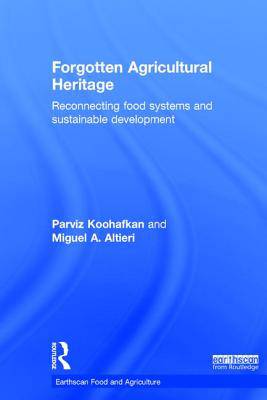
- Afhalen na 1 uur in een winkel met voorraad
- Gratis thuislevering in België vanaf € 30
- Ruim aanbod met 7 miljoen producten
- Afhalen na 1 uur in een winkel met voorraad
- Gratis thuislevering in België vanaf € 30
- Ruim aanbod met 7 miljoen producten
Forgotten Agricultural Heritage
Reconnecting Food Systems and Sustainable Development
Parviz Koohafkan, Miguel A AltieriOmschrijving
Contemporary agriculture is often criticized for its industrial scale, adverse effects on nutrition, rural employment and the environment, and its disconnectedness from nature and culture. Yet there are many examples of traditional smaller scale systems that have survived the test of time and provide more sustainable solutions while still maintaining food security in an era of climate change. This book provides a unique compilation of this forgotten agricultural heritage and is based on objective scientific evaluation and evidence of the value of these systems for present and future generations.
The authors refer to many of these systems as Globally Important Agricultural Heritage Systems (GIAHS) and show how they are related to the concepts of heritage and the World Heritage Convention. They demonstrate how GIAHS based on family farms, traditional indigenous knowledge and agroecological principles can contribute to food and nutrition security and the maintenance of agro-biodiversity and environmental resilience, as well as sustain local cultures, economies and societies.
Two substantial chapters are devoted to descriptions and assessments of some 50 examples of designated and potential GIAHS from around the world, including rice-fish culture in China, mountain terrace systems in Asia, coffee agroforestry in Latin America, irrigation systems and land and water management in Iran and India, pastoralism in East Africa, and the dehesa agrosilvopastoral system of Spain and Portugal. The book concludes by providing policy and technical solutions for sustainable agriculture and rural development through the enhancement of these systems.
Specificaties
Betrokkenen
- Auteur(s):
- Uitgeverij:
Inhoud
- Aantal bladzijden:
- 272
- Taal:
- Engels
- Reeks:
Eigenschappen
- Productcode (EAN):
- 9781138204133
- Verschijningsdatum:
- 22/11/2016
- Uitvoering:
- Hardcover
- Formaat:
- Genaaid
- Afmetingen:
- 156 mm x 233 mm
- Gewicht:
- 709 g

Alleen bij Standaard Boekhandel
Beoordelingen
We publiceren alleen reviews die voldoen aan de voorwaarden voor reviews. Bekijk onze voorwaarden voor reviews.











